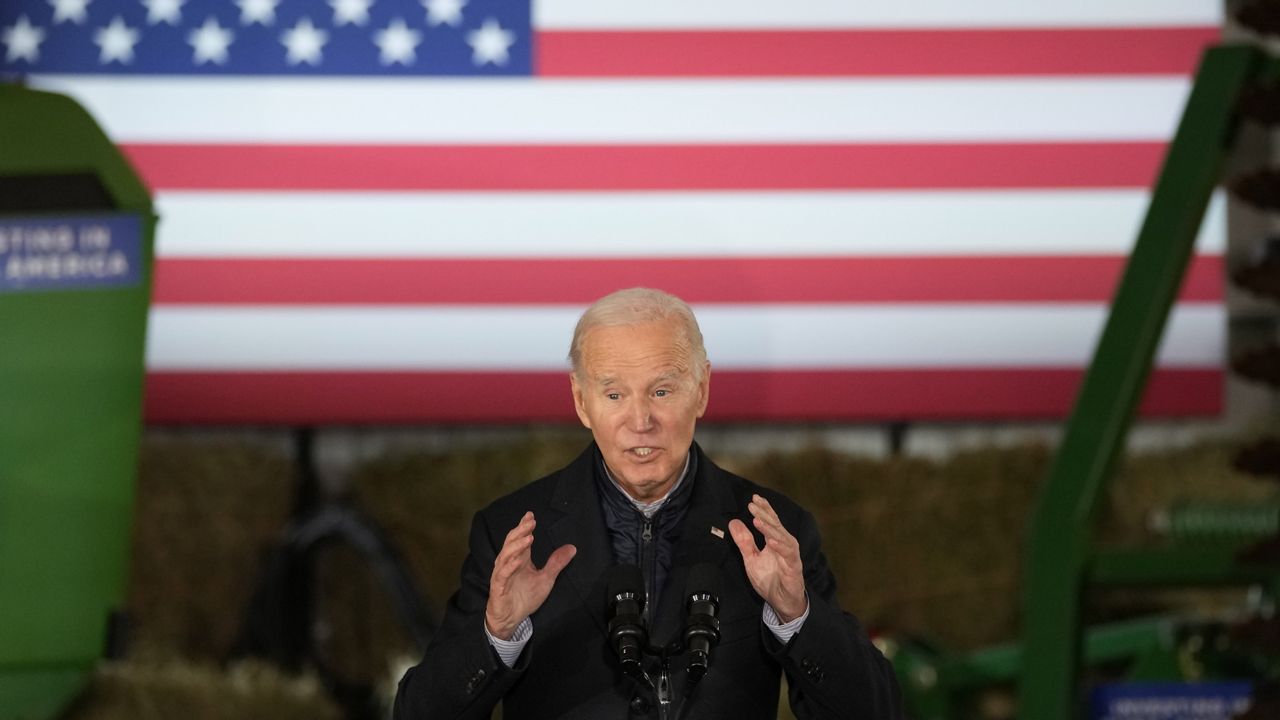Visiting a third-generation family farm in Minnesota on Wednesday, President Joe Biden took his economic pitch to rural America, announcing $5 billion in investments to help update infrastructure, boost high-speed internet and aid agricultural producers and small businesses in implementing climate-focused practices.
“It's about investing in all, all of America – all of it, including rural America. It's about making things in rural America again. And that's exactly what the historic legislation we passed has done, creating new and better markets and new income streams so that generations of rural Americans can begin to thrive again,” Biden said.
The president’s stop at Dutch Creek Farms in Northfield kicks off the administration’s latest economic messaging blitz – this one specifically focused on rural communities – as the president continues his mission to convince voters his economic platform is better than the often GOP-favored “trickle-down” approach.
“Trickle-down economics – and it hit rural America especially hard. It hollowed out mainstream, telling farmers the only path to success was to get big or get out,” Biden said.
Wednesday’s announcements include $1.7 billion in funding aimed at assisting farmers, ranchers and foresters in adopting techniques with the changing climate in mind.
In an interview with Spectrum News on Wednesday, Chair of the Economic Advisers to the president Jared Bernstein noted that includes practices like “cover crops, which are crops that are more resilient to erosion, nutrient management, prescribed grazing, and carbon storage in the soil to help reduce greenhouse gas emissions while improving soil health and water quality.”
The White House specifically pointed to the location the president visited on Wednesday, which grows corn and soybeans and raises hogs, as an example of a farm that has already implemented one of such techniques – noting it grows crops that naturally sequester carbon.
Meanwhile, building on several recent announcements from the administration focused on strengthening the nation’s electric grid, the president committed $274 million to expand access to high-speed internet across eight states.
“This is key in the sense that high-speed internet is like economic oxygen to these areas, when it comes to doing financial kinds of exercises and making sure that you can communicate with the rest of the world with the same kind of speed that you can sitting in a high tech firm in San Francisco,” Bernstein said.
“We're getting funding to these communities in every corner of the country because no kid should have to sit in the back of their mom's car in a McDonald's parking lot in order to get their homework done,” White House Infrastructure Implementation Coordinator Mitch Landrieu told reporters on a call on Tuesday.
The president on Wednesday also announced $1.1 billion in loan and grant awards to rehabilitate infrastructure in rural areas; $2 billion in funding for communities in the Rural Partners Network to spur job creation and build infrastructure; and $145 million through the Rural Energy for America Program to help producers and small business owners make energy efficiency improvements, such as installing “clean energy technologies like solar panels.”
“My plan is about investing in rural America, it's about something else as well: It's about restoring pride into rural communities that have been left behind for far too long,” Biden said.
“They've suffered decades of disinvestment, and that's what the President will be talking about today – reversing that disinvestment with deep reinvestment in rural America,” Bernstein said of rural communities which have, for years, faced higher poverty rates than metro areas.
The president billed Wednesday’s moves as an important advancement of his goal to create jobs all across the nation to ensure people do not need to leave their communities to find employment and opportunity.
“He believes that if you want to stay where you are, you ought to have the opportunity to do so, you ought to have a rich tapestry of jobs, of industries, of innovative sectors to go into,” Bernstein said.
“It's reflective of President Biden's belief that zip code ought not to determine your economic future,” Agriculture Secretary Tom Vilsack who accompanied Biden to Minnesota on Wednesday told reporters on Tuesday’s call.
Biden’s stop in Minnesota comes on the heels of the administration's third “Investing in America” tour earlier this month in which top officials traveled the country seeking to pitch the American people on the president’s economic agenda as he seeks another four years in the White House.
The new messaging effort kicking off on Wednesday, officials said, will focus on rural America and will send administration officials and cabinet members “barnstorming” the country over the next two weeks.
The visit to Minnesota took place less than a week after Minnesota Congressman Dean Phillips announced he is challenging Biden for the Democratic presidential nomination in 2024. Press Secretary Karine Jean-Pierre would not comment on whether there was any connection between the two, citing the Hatch Act, which limits the ability of federal employees to engage in political activities and conversations while on the job.



